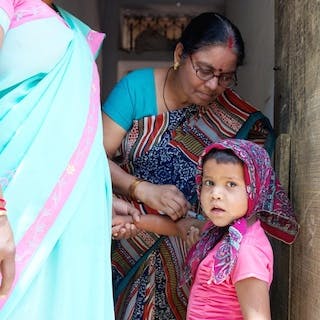![India_Varanasi_MeaslesCampaign_2013 34[1]](https://unf.imgix.net/2018/07/India_Varanasi_MeaslesCampaign_2013-3411.jpg?auto=compress%2Cformat&ixlib=php-3.3.1)
Photo credit: UNICEF/Tom Pietrasik
With a measles outbreak making headlines in the United States, we thought it would be a good time to repost the piece we shared last year on six reasons why you should care about eliminating measles around the world, a key priority for the United Nations and the UN Foundation. We’ve also updated the post with the latest data from the World Health Organization (WHO).
- About 400 people, mostly children, die of measles every day. In fact, measles is one of the top killers in the world of children under the age of 5. WHO calls measles “one of the most infectious diseases known to humankind.”
- WHO recommends every child get two doses of the measles vaccine, but in 2013, an estimated 21.5 million infants didn’t even get a first dose. To reach children and stop measles in its track, it’s important for countries to incorporate the measles vaccine in their routine health services. While this is happening more and more, many of the world’s poorest children are being left behind – putting their lives at risk.
- It only costs about $1 to vaccinate a child in a developing country against measles. Vaccines are one of the most cost-effective solutions we have to protect children from deadly diseases.
- 1.8 billion children have been vaccinated against measles since 2001. A global partnership called the Measles Initiative (now the Measles & Rubella Initiative) launched in 2001. Working with 80 countries, this partnership has helped vaccinate children and drive progress against measles. Thanks in large part to the initiative’s efforts, measles deaths have decreased by 75% worldwide since 2000. Global measles vaccination coverage remains steady at 84%.
- An estimated 15.6 million deaths were prevented from 2000-2013 thanks to measles vaccination. In this decade, the Measles & Rubella Initiative expects the vaccine to prevent another 13.4 million deaths.
- Until we end measles, we are all at risk. A highly infectious disease like measles doesn’t respect borders. We increasingly see measles cases crop up in countries that have been certified measles-free, imported from other countries where the disease persists. The world should be united in its commitment to end measles because, until we achieve that goal, measles anywhere is a threat everywhere.
TAKE ACTION: We have made progress in the fight against measles, but we have more work to do. Share this post with your friends and family on Twitter and Facebook and visit the Measles & Rubella Initiative at measlesrubellainiative.org to learn more.

